

National youth groups : Italian fascists. The 20th Century has seen the rise of two basic types of boys uniformed youth groups.
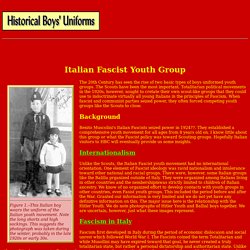
The Scouts have been the most important. Totalitarian political movements in the 1920s, however, sought to cretate their own scout-like groups that they could use to indoctrinate virtually all young Italians in the principles of Fascism. When fascist and communist parties seized power, they often forced competing youth groups like the Scouts to close. Background Benito Muscolini's Italian Fascists seized power in 1924??. Internationalism. A Nation of Fascists? Life in Fascist Italy.
The Church and Mussolini. Youth in Fascist Italy. Women in Fascist Italy. Opera Nazionale Dopolavoro. The National Recreational Club (Opera Nazionale Dopolavoro, or OND) was the Italian Fascist leisure and recreational organization for adults.
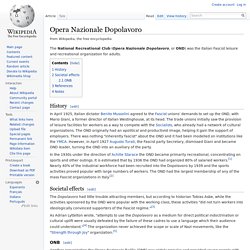
History[edit] In April 1925, Italian dictator Benito Mussolini agreed to the Fascist unions’ demands to set up the OND, with Mario Giani, a former director of Italian Westinghouse, at its head. The trade unions initially saw the provision of leisure facilities for workers as a way to compete with the Socialists, who already had a network of cultural organizations. The OND originally had an apolitical and productivist image, helping it gain the support of employers. There was nothing "inherently fascist" about the OND and it had been modelled on institutions like the YMCA.
In the 1930s under the direction of Achille Starace the OND became primarily recreational, concentrating on sports and other outings. Societal effects[edit] ONB[edit] References[edit] Jump up ^ de Grazia, Victoria. Notes[edit] Bessel, Richard, ed. Daily Life under Mussolini. This web site was designed by Patrick Myers and is intended solely for educational purposes.Daily Life Under Mussolini It was the goal of Benito Mussolini and the Italian Fascist Party to control every aspect of the lives of Italian citizens.
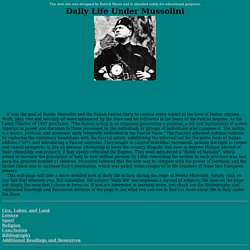
Work, play, rest and worship all were influenced by the Duce and his followers in the years of the Fascist Regime. As the Labor Charter of 1927 proclaims, "The Italian nation is an organism possessing a purpose, a life and instruments of action superior in power and duration to those possessed by the individuals or groups of individuals who compose it. Life in Fascist Italy. Relations with the Catholic Church Mussolini had to develop good relations with the Roman Catholic Church simply because, regardless of his absolute power as the Duce, the Catholic Church was a powerful institution.
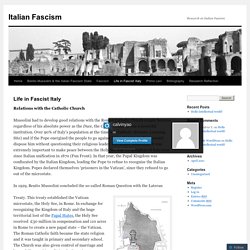
Over 90% of Italy’s population at the time was Catholic (History Learning Site) and if the Pope energized the people to go against Mussolini, the Italians would dispose him without questioning their religious leader. For Benito Mussolini, it was extremely important to make peace between the Holy See and the Kingdom of Italy ever since Italian unification in 1870 (Fun Front).
Italian Life Under Fascism - Italian Fascism. Fascism was unique among the radical forces produced by the early twentieth century, developing out of World War I without any clear predecessor in the nineteenth century.
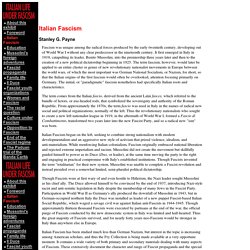
It first emerged in Italy in 1919, catapulting its leader, Benito Mussolini, into the premiership three years later and then to the creation of a new political dictatorship beginning in 1925. The term fascism, however, would later be applied to an entire cluster or genus of new revolutionary nationalist movements in Europe between the world wars, of which the most important was German National Socialism, or Nazism, for short, so that the Italian origins of the first fascism would often be overlooked, attention focusing primarily on Germany. The initial, or "paradigmatic" fascism nonetheless had specifically Italian roots and characteristics. Though Fascists were at first wary of and even hostile to Hitlerism, the Nazi leader sought Mussolini as his chief ally.
Life in Fascist Italy. Life in Mussolini's Italy was little different from other dictatorships which existed between 1918 and 1939.
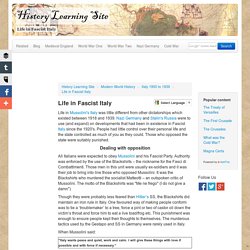
Nazi Germany and Stalin'sRussia were to use (and expand) on developments that had been in existence in Fascist Italy since the 1920's. People had little control over their personal life and the state controlled as much of you as they could. Those who opposed the state were suitably punished. Dealing with opposition All Italians were expected to obey Mussolini and his Fascist Party.